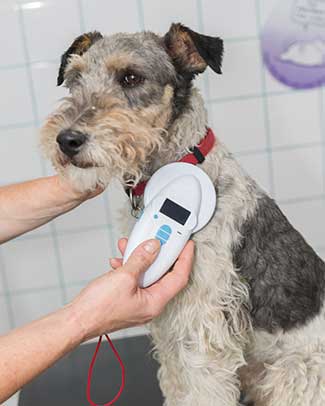At Watson’s Friends Animal Hospital, here in Palmetto, Florida we recommend that every pet receive a microchip, a permanent identification that lasts their entire lifetime. If the unthinkable happens, we want to help provide a way for your pet to be reunited with you and your family by always having your information on them.
What Is A Pet Microchip?
It is a small electronic chip the size of a grain of rice. Microchips are activated by specific scanners that transmit an identification number that is displayed on the scanner's screen. A microchip is inserted under the skin using a needle.

Getting your pet microchipped can be intimidating, but we are here to ensure the process is quick and painless. It can be implanted during a routine veterinary office visit and doesn't take more than a few seconds. Usually, a distraction with a delicious treat will take your pet's mind off what is happening. A microchip can also be implanted while your pet is under anesthesia for a procedure, such as a spay or neuter. They will never know it happened.
- Unlimited free updates to your pet’s profile or contact information either by phone or online
- 24/7 access to our lost pet helpline
- Access to the HomeAgain network of over 3 million PetRescuers, animal shelters and veterinarians
- Rapid Lost Pet Alerts and Lost Pet Posters
- 24/7 access to the Pet Medical Hotline
- Travel Assistance for pets found 500 or more miles from from home
Common Misconceptions?
- All pets should wear collar tags imprinted with their name and the phone number of their owner, but only a microchip provides a permanent ID that cannot fall off, be removed, or become impossible to read.
- Pet microchips are not tracking devices. They are radio-frequency identification (RFID) implants that provide permanent ID for your pet. Because they use RFID technology, microchips do not require a power source like a GPS. When a microchip scanner is passed over the pet, the microchip gets enough power from the scanner to transmit the microchip's ID number. Since there's no battery and no moving parts, there's nothing to keep charged, wear out, or replace. The microchip will last your pet's lifetime.
- Microchips carry only a unique identification number. If your pet gets lost and is taken to a vet clinic or animal shelter, your pet will be scanned for a microchip to reveal his unique ID number. That number will be called into the pet recovery service, and you will be contacted using the contact information on file with your pet's microchip. It is vital to keep your contact information up to date so that you can be reached.
- A microchip will normally last the lifetime of your pet because it is composed of biocompatible materials that will not degenerate over time. HomeAgain's microchip products have a Bio-Bond anti-migration feature to help ensure the chip stays where it's implanted. Also, since microchips require no power source and have no moving parts, there's nothing that can wear out and need to be replaced. Pet owners can also check to make sure their pet's microchip is still working by asking a vet to scan it during their pet's next checkup.
- A microchip is only the first step! You must register your pet's microchip to give your pet the best protection. Register your pet's microchip in a database, such as the HomeAgain National Pet Recovery Database, with your contact information so you can be contacted when your lost pet is found. Also, remember to keep your contact information up to date whenever you move or change phone numbers.
Do Microchips Bring Pets Home?
Did you know cats with microchips are 20 times more likely to return home than cats without microchips? Do you have a dog? Dogs with microchips are 2.5 times more likely to be returned home than dogs with microchips.
- After your pet receives its microchip, register it and provide your current contact information. Microchips guarantee that your pet ALWAYS has your current contact information, even if your pet loses its collar with tags. (Make sure you update your information every time you move! This is essential to ensure that your pet returns to you.)
- Microchips significantly increase the chance your pet will return home to you and your family. Giving your pet the best chance is the best thing a responsible owner can do to bring them home.
- If you like to travel, microchips are required for most international travel if you bring your pets. It's also always a good idea since you are far from home.
- Microchips are essential for identifying purposes in health testing and medical records. Think of microchips as a permanent medical ID band.
- Microchips aid in pet theft cases and offer proof of ownership. If you are interested in microchipping your pet, give us a call at 941-297-0880! We would be happy to set up an appointment or have one implanted on an upcoming procedure or appointment. If you have any questions or concerns, we would be happy to answer them. We can't wait to see you and your pet at their next appointment.
